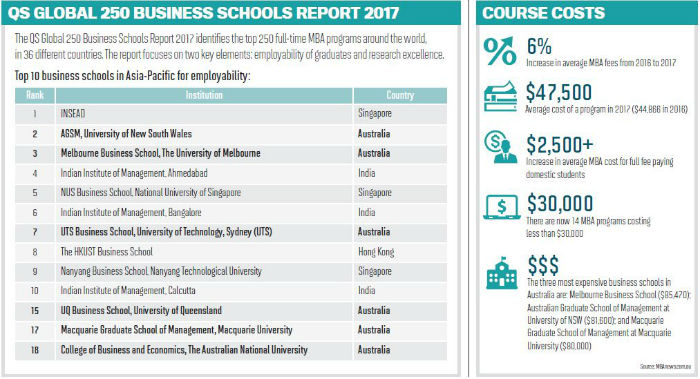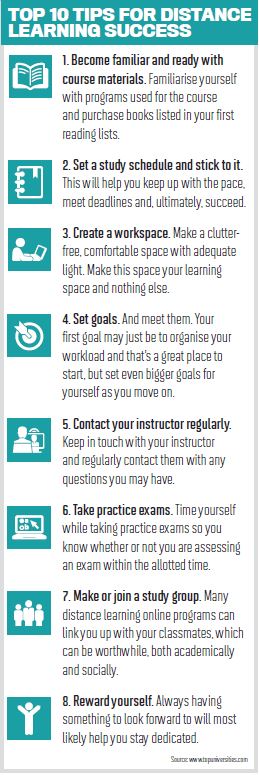They say that a change is as good as a holiday – perhaps it’s time to apply that logic to your career? The answer may be postgraduate study, of which the shining jewel remains the MBA
Following a move from a small town in Zimbabwe to Perth and then Melbourne early in her life,
Barb Hyman, EGM people and culture at REA Group, eventually opted to study law at
Monash University. However, once she entered the workforce as a solicitor, she felt something was missing from her working life. She commenced and completed an MBA at Melbourne Business School, which relaunched her career in a totally new direction. “As a lawyer you execute someone else’s ideas – I had ideas; I wanted to be heard,” Hyman told HRD. “Doing an MBA was a way of fast-tracking; it was a big risk, I went into it blind. But it gave me an opportunity to be in those front line conversations and be part of that ideation.”
MBA in hand, Hyman commenced work with the highly esteemed Boston Consulting Group and then went on to work in various marketing and business development roles for Orica and the Museum of Contemporary Art in Sydney, before landing the HR role at REA Group.
Hyman’s story is typical of why many professionals opt to undertake an MBA – a change in career path.
The MBA is still one of the most valuable postgraduate degrees for a professional to have in their educational arsenal. Not just because of the weight an MBA designation adds to job applications, but because of the relevancy of the knowledge and skills acquired throughout the study process. On top of that, the networking opportunities an MBA degree affords students is unparalleled.
As Chris Patton, pro vice chancellor (international and enterprise) at Southern Cross University explains, most MBAs – including the MBA offered by Southern Cross – are heavily focused on leadership within a management context, which is a pivotal trait in successful advancement.
“As we move into the expanding digital age, leadership no longer means do as I say,” Patton explains. “It’s a professional approach to empowering employees and being able to draw out their best, with efficiency and impact.”

Staying ahead of the game
MBAs have had to move with the times in order to stay relevant to a rapidly changing business world. Contemporary MBAs differ from traditional programs in at least two key respects. First, rather than treat each topic area as separate, today’s best programs focus on integrating knowledge around solving concrete, real-life business problems.
Second, there has been a growing demand for programs that allow candidates to combine the breadth of the traditional MBA curriculum with a depth and specialisation in a particular area like technology or change management.
Indeed, 2016 research covering 1,000 students at 35 business schools worldwide (including three from Australia), highlighted just how rapidly the MBA space is changing.
The resulting report, Time for MBA 2.0, produced by education consultants CarringtonCrisp with support from the European Foundation for Management Development, pointed to a move away from the traditional two-year MBA towards options such as e-learning and blended learning. In addition, the popularity of specialist MBAs has soared to the point that interest in specialist and generalist MBAs is more or less equal – the most popular specialist MBAs were finance, international management, IT and entrepreneurship.
Students were also found to have high expectations that a business school will assist them with finding a job upon graduating. The top five career services that prospective students expect to be provided are: career coaching, a mentorship program, career development workshops, consulting projects with a company and a personalised career plan.
The report also shed light on what skills students expect to develop from MBA study.
At the top of the list was leadership, followed by critical thinking skills, entrepreneurialism, negotiation skills and communication skills. Self-awareness came at the bottom of a list of 17 skills.
The report also noted several contrasts between genders. Among them was that men are more likely to want to improve their entrepreneurial skills, with women prioritising negotiating skills.
Business schools have reacted. Course delivery is the prime example of the attempt to match what students are looking for. Course materials can now be supplied online well in advance of classes commencing, and greater study flexibility is now offered. Australian Catholic University (ACU), for example, offers both a standard MBA during weekday evenings (which has a more international flavour) as well as the MBA Executive, taught part-time in weekend intensive mode.
Dr Al Marshall, Faculty of Law and Business at ACU says the MBA Executive program attracts executives from a diverse range of organisations with an average of 17 years’ managerial experience. The face-to- face intensive weekend mode of delivery provides opportunities to network and engage with industry and business leaders as guest speakers who bring in a wealth of experience.
“It’s no longer enough to teach the basics,” Marshall says. “All our course content must be practical, ethical and global in outlook. Social responsibility, ethical leadership, governance, sustainability, innovation and entrepreneurship are the cornerstones of our programs.”
 Theory mixed with practice
Theory mixed with practice
The 70/20/10 learning framework, which captures the three types of learning – experiential, social and formal – is typically used in MBAs, as Patton explains: “What we’ve learnt from the 70/20/10 model is that significant development also happens outside of a formal learning environment. Southern Cross students benefit from varied assessments, across various formats. All assignments, case studies, presentations, analysis and reports are based around contemporary management and shows you how to develop solutions to complex commercial situations. Students are equipped with real-world skills, which they can apply to their workplaces throughout their studies.”
Business schools are also continuing to forge strong relationships with the business world, both to shape course content and to expose students to real-life business challenges.
Associate professor Jo Earl of
Flinders University says the opportunity for Flinders students to take part in practical work-related experience is an essential part of the learning experience. Flinders MBA students have the opportunity to participate in industry placements and projects where students work as a team to solve a real business problem. Flinders MBA students have completed placements with businesses such as Business SA, BT Financial and Scope Global.
“Our work integrated learning placements offer students the opportunity to work in real roles in real organisations and try out potential career paths,” Earl says. “Our advisory group, consisting of seasoned business professionals, provides regular input into initiatives and a real-world perspective. Our teaching staff interact and present their research out into the community so there is a regular flow of information back and forth between businesses and the university environment.”
Students are encouraged to engage with the mentoring opportunities on offer, including networking events and other informal opportunities to gain job-related experiences.
“Through experiential learning, our students gain fundamental insight into the nature and complexities of the workplace, which makes them more adaptable and valuable to prospective employers,” Earl says.
Patton adds that Southern Cross is “talking to the corporate world daily”, which enables the university to identify emerging trends and content needs and add these into the MBA. Southern Cross will also align with the needs of any organisation it works with in order to build bespoke partnerships to deliver an MBA that’s relevant to their employees’ career goals and succession plans.
“HR leaders, especially those in organisations with long average tenure, often tell us that they want their staff to be exposed to other industries while studying the MBA so they can discover new ways of doing things and apply those in their own industry, so our online learning environment is built to facilitate and encourage that type of interaction and networking,” he says.
EXECUTIVE MBAs
Another relatively recent phenomenon has been the development of Executive MBAs. These are designed to specifically meet the education needs of managers and executives, allowing students to earn an MBA (or another business-related graduate degree) in two years or less while working full-time. To cite one example, Monash has introduced an EMBA designed for experienced professionals who have at least six years’ work experience and at least four years’ professional or managerial experience. The MBA, by comparison, remains aimed more at emerging professionals with a minimum of three years’ work experience and one year of professional/managerial experience.
ACU’s Executive MBA, for example, enrols students who have on average 17 years’ experience in industry. Each student brings valuable insights to the cohort.
“We have industry leaders conducting guest lectures through our masterclass and MBA experience evenings,” Marshall explains. “These industry experts present real-world business challenges that are workshopped and solved in class.”
Students in ACU’s MBA Executive come from a diverse background – banking, retail, HR, accounting, through to marketing, consulting and teaching – and Marshall notes that small boardroom-style classes mean that networking is enhanced by working closely with other students. ACU also offers an international study tour, which exposes students to global issues. Learning and developing through structured course materials is the vehicle ACU uses to launch the experiential and social/exposure aspects of the 70/20/10 model.
Marshall adds that ACU’s MBA Executive course materials are delivered online, meaning that group work is often carried out in online forums where the lecturers can monitor progress, and information is shared via learning platforms. However, he believes the physical interaction between the lecturer and students, and students networking with each other, is still an important component of the MBA experience.
“We recognise that students are time-poor, so our MBA Executive program caters to busy professionals by running weekend intensive classes in short, manageable blocks mixed with online learning,” he says.
 Going digital
Going digital
The decision to tackle postgraduate study should not be taken lightly. Juggling family, social and work lives can be tough and business schools have responded by offering online learning and the ability to complete courses in an accelerated mode. Flinders University’s online option, for example, offers opportunities for peer interaction and assessment and the convenience of saving on travel time and managing conflicting schedules.
The Flinders online modules allow students the option of studying entirely from home.
“Some students might not want to complete an MBA entirely online but work and family demands might require this type of flexibility,” Earl says. “We empower students to design a study plan around work and family incorporating online, regular weekly classes or intensive workshops.”
Likewise, SCU’s online MBA uses a bespoke online learning environment built specifically for SCU student needs, and its virtual classroom facilities provide fully interactive and connected learning, including a social platform, notification and discussion boards, and interactive presentations, all on the terms of the individual students.
Earl adds that students are increasingly recognising how important the social aspects of education are and will seek opportunities to network. How can this be facilitated with online learning? Flinders University offers an online student lounge where students can interact with each other virtually. This social aspect is mirrored on the physical campuses, which include a new $63m student hub and plaza where students can meet more informally. The hub also includes a dedicated 24/7 accessible study and social lounge space, called The Cove, for postgraduate students.
“These spaces help our students connect, study and relax with full kitchen facilities, smart boards, bookable group study spaces and the latest technologies,” Earl says.
Making the choice
As more than 30 Australian universities now offer MBA programs, how can prospective students make the right choice?
Earl suggests that it’s essential to find a university that will support a student on their learning journey – this is critical because most people enrol in an MBA as they want to move up from a specialist role to a senior generalist management position or take their career in a new direction. Students might look at overall satisfaction and good teaching practice for postgraduate business courses (Quality Indicators for Learning and Teaching, or QILT).
Other key considerations will be price and duration. However, Patton says it’s also critical that students take into account their work, family and social obligations.
“Time is always a major deterrent for professionals looking to go back to school, which is why ensuring the university you end up choosing offers flexible learning and supported study is important, so you can continue to work full-time and not sacrifice family or social time,” he says.
Marshall adds that it’s critical to shop around and look at the alternatives and consider which delivery methods best suit your learning style. Beyond that, it is extremely important to consider the quality
of teaching staff. Finally, he suggests students should also think about:
- Currency of content
- Flexibility of delivery
- Flexibility of start dates and time allowed to complete
- Incorporation of technology
- Manageable class sizes
The future
As the workforce continues to evolve, major areas of focus within MBAs will shift. From traditional areas such as general management, Patton says business schools will likely see a shift towards a focus on responsible management. That is, economic and social impact, innovation and sustainability, and ethical decision making. There is also a bigger focus on getting closer to practice, and teaching the soft skills of management. We’ll also likely see:
- More specialisation – there continues to be increasing demand for MBAs that allow students to specialise in a particular area. Business schools are working hard on bringing new specialisations to market in the next few years.
- More flexibility – students increasingly want to study in a range of modes: online, intensive and face-to-face and mixed.
- Closer integration with workplace learning – most of the business schools contacted by HRD expect to be working closely with companies to ensure that in-house workplace learning is aligned to and recognised as part of MBA programs.
- Broader connections – a key to the MBA experience is the people you meet and study with. You learn from them, they become your support network and later they become key resources for you in your career. However, this should not be restricted to just the 20 or 30 people in your class. MBAs should increasingly provide you entry into a global network that can support you throughout your career and technology is making this possible.



 Theory mixed with practice
Theory mixed with practice Going digital
Going digital